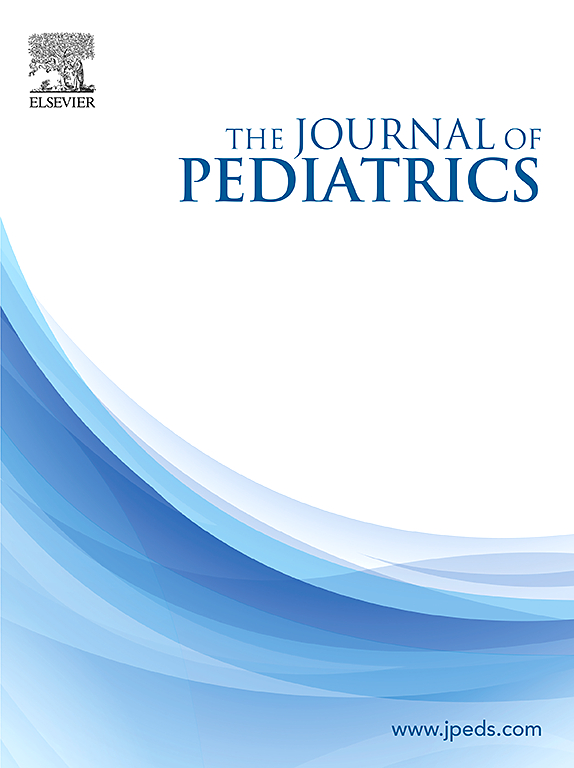Caregiver Values and Preferences Related to Surgical Decision-Making for Children with Medical Complexity
IF 3.9
2区 医学
Q1 PEDIATRICS
引用次数: 0
Abstract
Objective
To uncover the values and preferences of the caregivers for children with medical complexity using the test case of surgical treatment decision-making for pediatric neuromuscular scoliosis that will inform the future development of a decision support tool in this population.
Study design
We conducted a qualitative study of semistructured interviews of English- and Spanish-speaking caregivers of children with neuromuscular scoliosis from 2 geographically distinct children's hospitals. We used purposive sampling of language and treatment options selected to capture diverse experiences. Analysis was on the basis of grounded theory with synthesized caregiver values and preferences themes.
Results
From 47 participants, we completed 41 interviews (9 in Spanish). Caregivers had a mean age of 43.2 years, were mostly White (66%), and had children with a mean age of 15.6. In total, 64% chose surgery. The following values and preferences were important to many caregivers: reducing scoliosis-related pain, minimizing mobility limitations to optimize socioemotional quality of life, limiting the impact of comorbidities on overall quality of life, information provided by peer support, the uncertainty of outcomes due to underlying comorbidities, and the uncertainty related to the anticipated progression of their child's scoliosis curve. Caregivers experienced immense uncertainty related to treatment outcomes due to their child's comorbidities.
Conclusions
Caregivers of children with medical complexity may benefit from decision support that includes both values clarification exercises to help caregivers identify what of the many possible values and preferences are important to them and novel methods to communicate uncertainty in the care of CMC.
护理人员对医疗复杂儿童手术决策的价值观和偏好。
目的以小儿神经肌肉性脊柱侧凸(NMS)的手术治疗决策为测试案例,揭示医疗复杂性(CMC)患儿护理人员的价值观和偏好,为今后开发该人群的决策支持工具提供参考:研究设计:我们对来自两家地理位置不同的儿童医院、讲英语和西班牙语的 NMS 患儿护理人员进行了半结构化访谈的定性研究。我们采用有目的的语言和治疗方案取样,以获取不同的经验。分析以基础理论为基础,综合了护理人员的价值观和偏好主题:在 47 名参与者中,我们完成了 41 次访谈(9 次为西班牙语访谈)。照顾者的平均年龄为 43.2 岁,大部分为白人(66%),其子女的平均年龄为 15.6 岁。64%的人选择了手术治疗。以下价值观和偏好对许多照顾者来说非常重要:减少脊柱侧弯相关疼痛、尽量减少活动限制以优化社会情感生活质量、限制合并症对整体生活质量的影响、同伴支持提供的信息、潜在合并症导致的结果不确定性,以及与孩子脊柱侧弯的预期进展相关的不确定性。由于孩子的合并症,照护者在治疗结果方面经历了巨大的不确定性:结论:CMC 的护理者可能会从决策支持中获益,决策支持包括价值澄清练习,以帮助护理者确定在众多可能的价值和偏好中哪些对他们是重要的,以及在 CMC 护理中沟通不确定性的新方法。
本文章由计算机程序翻译,如有差异,请以英文原文为准。
求助全文
约1分钟内获得全文
求助全文
来源期刊

Journal of Pediatrics
医学-小儿科
CiteScore
6.00
自引率
2.00%
发文量
696
审稿时长
31 days
期刊介绍:
The Journal of Pediatrics is an international peer-reviewed journal that advances pediatric research and serves as a practical guide for pediatricians who manage health and diagnose and treat disorders in infants, children, and adolescents. The Journal publishes original work based on standards of excellence and expert review. The Journal seeks to publish high quality original articles that are immediately applicable to practice (basic science, translational research, evidence-based medicine), brief clinical and laboratory case reports, medical progress, expert commentary, grand rounds, insightful editorials, “classic” physical examinations, and novel insights into clinical and academic pediatric medicine related to every aspect of child health. Published monthly since 1932, The Journal of Pediatrics continues to promote the latest developments in pediatric medicine, child health, policy, and advocacy.
Topics covered in The Journal of Pediatrics include, but are not limited to:
General Pediatrics
Pediatric Subspecialties
Adolescent Medicine
Allergy and Immunology
Cardiology
Critical Care Medicine
Developmental-Behavioral Medicine
Endocrinology
Gastroenterology
Hematology-Oncology
Infectious Diseases
Neonatal-Perinatal Medicine
Nephrology
Neurology
Emergency Medicine
Pulmonology
Rheumatology
Genetics
Ethics
Health Service Research
Pediatric Hospitalist Medicine.
 求助内容:
求助内容: 应助结果提醒方式:
应助结果提醒方式:


